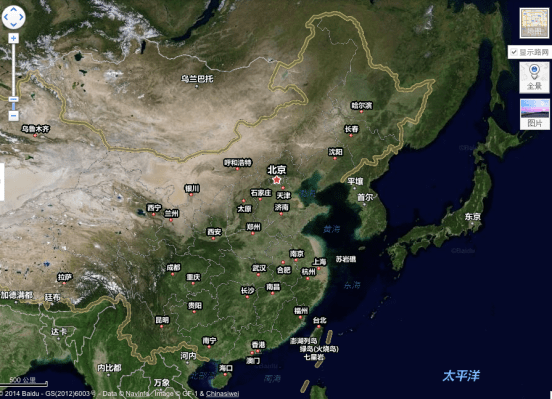Search giant Baidu has made no secret of its ambitions to expand its business outside of China by way of mobile services. Now it’s struck a deal with Nokia that could help it with that by serving domestic users abroad. Nokia’s mapping and navigation business Here says that it will now power maps for Baidu outside of China, specifically aiming the service at the large number of Chinese “globetrotters” — the world’s largest outbound tourism market.
Here will power both desktop as well as Android and iOS apps, starting with Taiwan first and then adding other territories at a later stage.
The companies are not disclosing the financial terms of the deal. “It’s a licensing deal in the conventional sense so Baidu is licensing our map data, but we can’t give any further info unfortunately,” says a spokesperson.
Baidu offers extensive mapping services in China (a screenshot of its existing maps service is pictured above), and that was one of the key components in a reported investment deal that Baidu is making in car service Uber. But it’s less good on that data outside of its domestic market.
Mapping and navigation have long been hot areas for platform companies looking for strong positions in mobile. The reason for that is pretty clear: as our smartphones have turned from basic voice and text communication devices into intelligent assistants, location services — which underpin so much of what we do and how we do it when on the move — are central to that.
Here is a natural partner for Baidu, in that it’s not a direct competitor as Google might be and works cross-platform in a way that Apple does not. Here has just announced an update that will make its mapping apps available across all Google Play markets and Android devices, and is finally re-publishing a new iOS app in early 2015, after pulling it in 2013.
Here’s parent company Nokia, meanwhile, has also been focussing on the China market for years now and so will have some existing Chinese language expertise and IP that it can use to develop custom maps in the language covering other territories. “People are already using HERE in Chinese language in different parts of the world,” the spokesperson tells me.
Here offers maps for nearly 200 countries, with turn-by-turn navigation for 118 of them.
According to the China National Tourism Association (via China Travel Guide) the number of Chinese travellers visiting foreign countries have grown drastically over the last several years as China’s economy has expanded its number of moneyed citizens has grown. In 2013, 98.19 million Chinese people travelled abroad, up 18% on 2012 and totalling $128.7b in expenditures (up 27% on the year before).
It estimates that in 2014 that number will have risen to 114 million with total expenditure of $140 billion.
“Every day, millions of people count on Here to explore the world and discover new places whether at home or on the go,” Bruno Bourguet, SVP and head of sales for Here, said in a statement. “Together with Baidu, a new customer for us, we want to help the growing number of Chinese tourists get the most from their travels.”
Elsewhere, Baidu has been flexing its international muscle by building services for users outside its core Chinese-language market.
In 2013, Baidu inked a deal with France Telecom to load its mobile browser on to Android devices that were getting sold in Africa. Nokia is not commenting on whether it is going to power any services in these, but it is not ruling it out.
“Our expertise is in the mapping/location services domain so that defines the scope of our work with Baidu,” the spokesperson says.
As we pointed out last week, in the last quarter, Here posted net sales of €236 million on an operating profit of zero out of total net sales at Nokia of €3.3 billion.
Updated throughout with Nokia comments.
